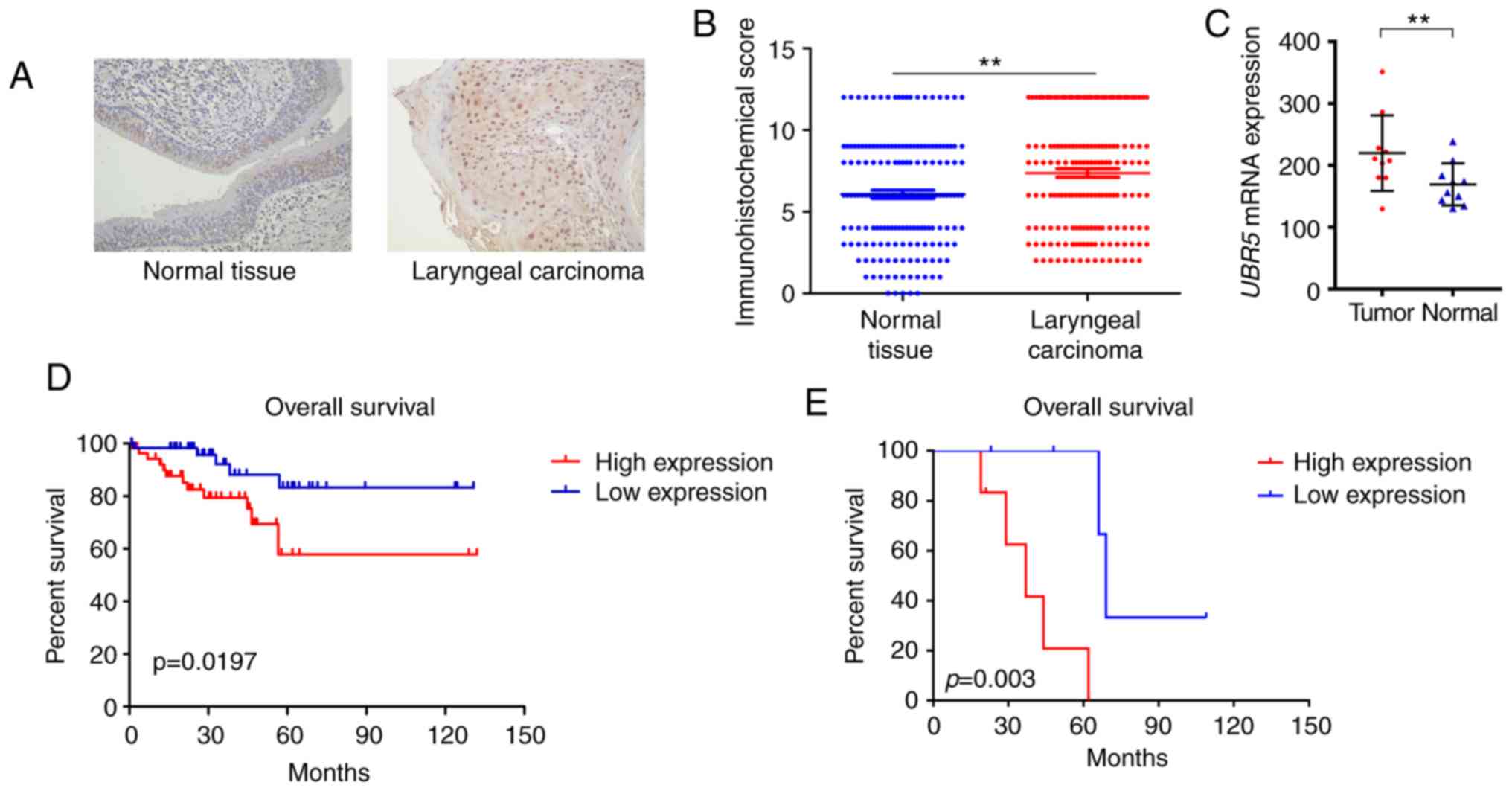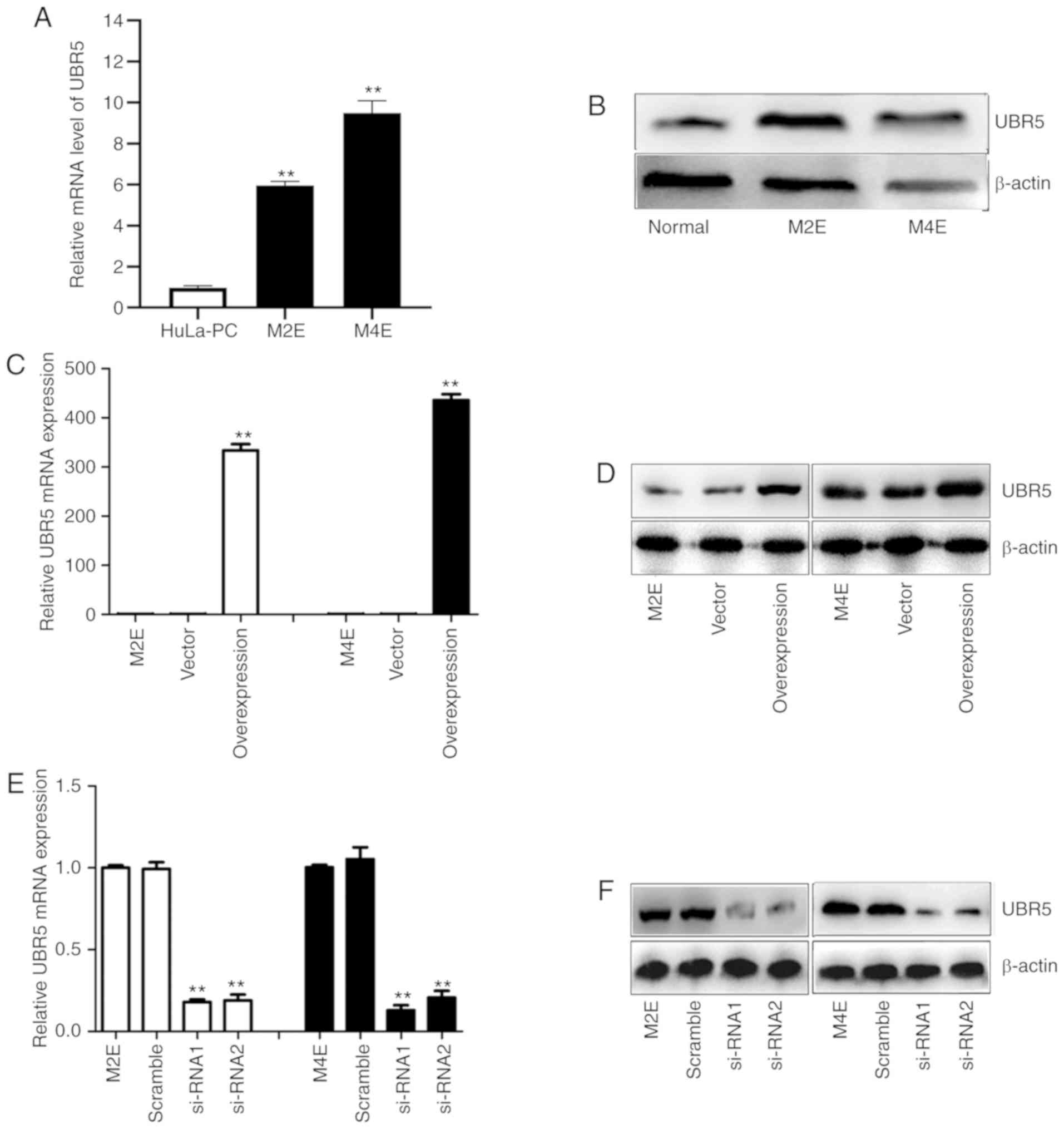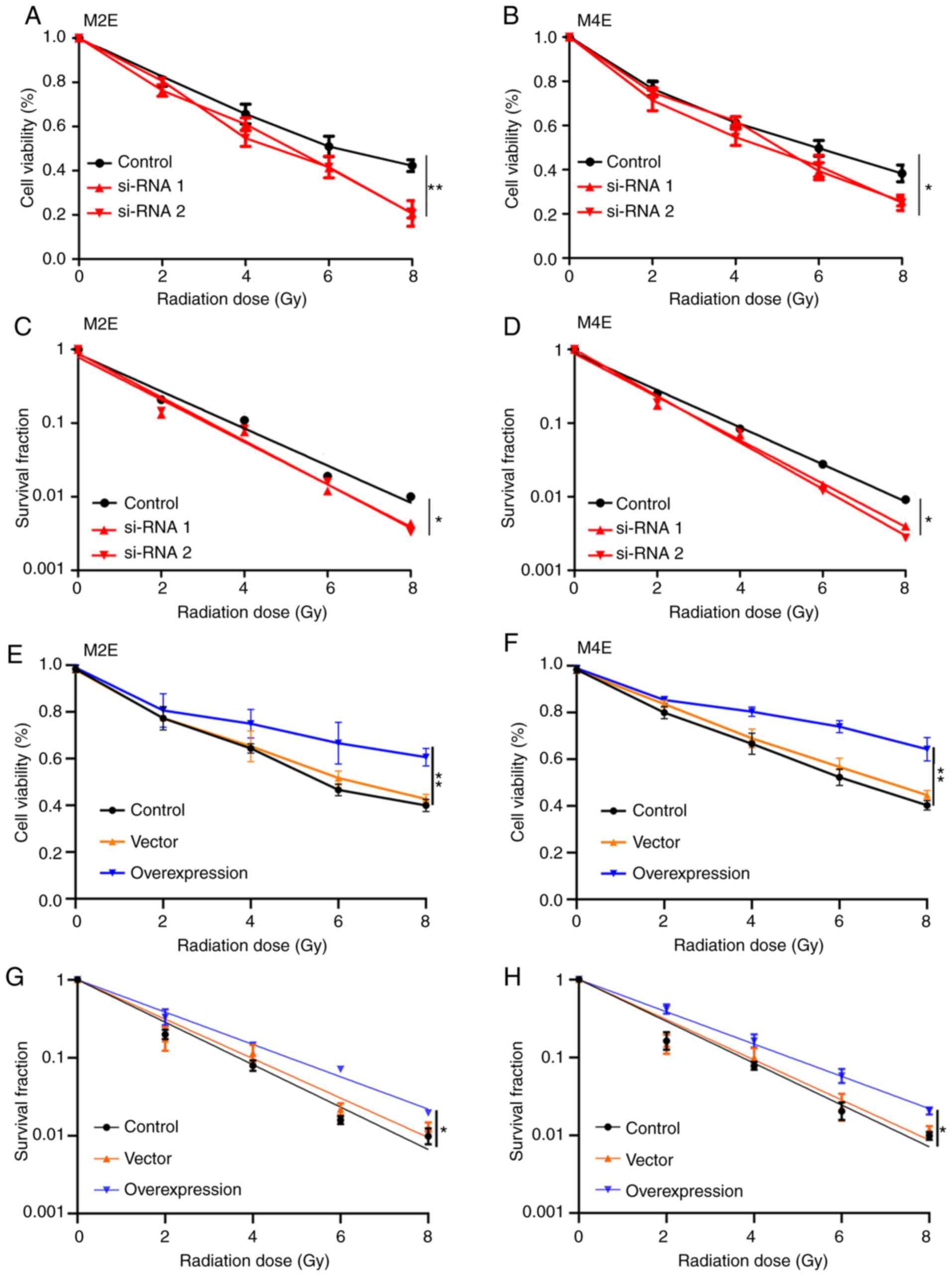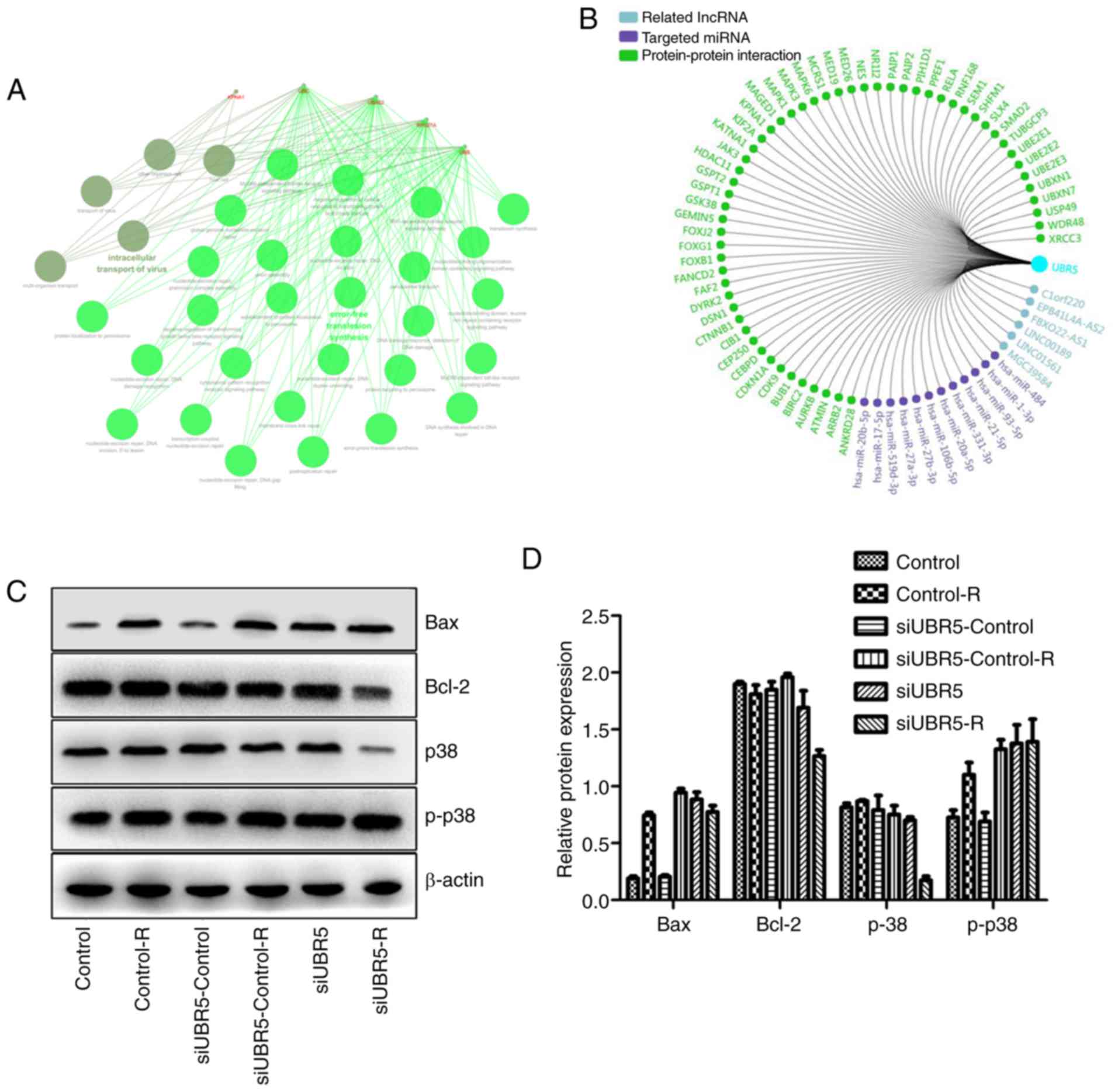|
1
|
American Society of Clinical Oncology, .
Pfister DG, Laurie SA, Weinstein GS, Mendenhall WM, Adelstein DJ,
Ang KK, Clayman GL, Fisher SG, Forastiere AA, et al: American
Society of Clinical Oncology clinical practice guideline for the
use of larynx-preservation strategies in the treatment of laryngeal
cancer. J Clin Oncol. 24:3693–3704. 2006. View Article : Google Scholar : PubMed/NCBI
|
|
2
|
Tobias JS, Monson K, Gupta N, Macdougall
H, Glaholm J, Hutchison I, Kadalayil L and Hackshaw A; UK Head and
Neck Cancer Trialists' Group, : Chemoradiotherapy for locally
advanced head and neck cancer: 10-year follow-up of the UK Head and
Neck (UKHAN1) trial. Lancet Oncol. 11:66–74. 2010. View Article : Google Scholar : PubMed/NCBI
|
|
3
|
Langendijk JA, Doornaert P, Verdonck-de
Leeuw IM, Leemans CR, Aaronson NK and Slotman BJ: Impact of late
treatment-related toxicity on quality of life among patients with
head and neck cancer treated with radiotherapy. J Clin Oncol.
26:3770–3776. 2008. View Article : Google Scholar : PubMed/NCBI
|
|
4
|
Duke RL, Campbell BH, Indresano AT, Eaton
DJ, Marbella AM, Myers KB and Layde PM: Dental status and quality
of life in long-term head and neck cancer survivors. Laryngoscope.
115:678–683. 2005. View Article : Google Scholar : PubMed/NCBI
|
|
5
|
Liu J, Zhang Y, Li Z, Liu S, Li H and Xu
Z: Benefit of salvage total pharyngolaryngoesophagectomy for
recurrent locally advanced head and neck cancer after radiotherapy.
Radiat Oncol. 12:1642017. View Article : Google Scholar : PubMed/NCBI
|
|
6
|
Pujo K, Philouze P, Scalabre A, Céruse P,
Poupart M and Buiret G: Salvage surgery for recurrence of laryngeal
and hypopharyngeal squamous cell carcinoma: A retrospective study
from 2005 to 2013. Eur Ann Otorhinolaryngol Head Neck Dis.
135:111–117. 2018. View Article : Google Scholar : PubMed/NCBI
|
|
7
|
Forastiere AA, Goepfert H, Maor M, Pajak
TF, Weber R, Morrison W, Glisson B, Trotti A, Ridge JA, Chao C, et
al: Concurrent chemotherapy and radiotherapy for organ preservation
in advanced laryngeal cancer. N Engl J Med. 349:2091–2098. 2003.
View Article : Google Scholar : PubMed/NCBI
|
|
8
|
Popovtzer A, Burnstein H, Stemmer S, Limon
D, Hili O, Bachar G, Sopov V, Feinmesser R, Groshar D and Shvero J:
Phase II organ-preservation trial: Concurrent cisplatin and
radiotherapy for advanced laryngeal cancer after response to
docetaxel, cisplatin, and 5-fluorouracil-based induction
chemotherapy. Head Neck. 39:227–233. 2017. View Article : Google Scholar : PubMed/NCBI
|
|
9
|
Shearer RF, Iconomou M, Watts CK and
Saunders DN: Functional roles of the E3 Ubiquitin ligase UBR5 in
cancer. Mol Cancer Res. 13:1523–1532. 2015. View Article : Google Scholar : PubMed/NCBI
|
|
10
|
Shearer RF, Frikstad KM, McKenna J, McCloy
RA, Deng N, Burgess A, Stokke T, Patzke S and Saunders DN: The E3
ubiquitin ligase UBR5 regulates centriolar satellite stability and
primary cilia. Mol Biol Cell. 29:1542–1554. 2018. View Article : Google Scholar : PubMed/NCBI
|
|
11
|
Biswas K, Sarkar S, Du K, Brautigan DL,
Abbas T and Larner JM: The E3 Ligase CHIP Mediates p21 degradation
to maintain radioresistance. Mol Cancer Res. 15:651–659. 2017.
View Article : Google Scholar : PubMed/NCBI
|
|
12
|
Nicholson J, Jevons SJ, Groselj B,
Ellermann S, Konietzny R, Kerr M, Kessler BM and Kiltie AE: E3
Ligase cIAP2 mediates downregulation of MRE11 and
radiosensitization in response to HDAC inhibition in bladder
cancer. Cancer Res. 77:3027–3039. 2017. View Article : Google Scholar : PubMed/NCBI
|
|
13
|
Dogan T, Gnad F, Chan J, Phu L, Young A,
Chen MJ, Doll S, Stokes MP, Belvin M, Friedman LS, et al: Role of
the E3 ubiquitin ligase RNF157 as a novel downstream effector
linking PI3K and MAPK signaling pathways to the cell cycle. J Biol
Chem. 292:14311–14324. 2017. View Article : Google Scholar : PubMed/NCBI
|
|
14
|
Rom O, Kaisari S, Aizenbud D and Reznick
A: Involvement of E3 Ubiquitin ligases in Cigarette Smoke
associated muscle catabolism. Free Radic Biol Med. 75 (Suppl
1):S52014. View Article : Google Scholar : PubMed/NCBI
|
|
15
|
Xie Z, Liang H, Wang J, Xu X, Zhu Y, Guo
A, Shen X, Cao F and Chang W: Significance of the E3 ubiquitin
protein UBR5 as an oncogene and a prognostic biomarker in
colorectal cancer. Oncotarget. 8:108079–108092. 2017. View Article : Google Scholar : PubMed/NCBI
|
|
16
|
Sanchez A, De Vivo A, Uprety N, Kim J,
Stevens SM Jr and Kee Y: BMI1-UBR5 axis regulates transcriptional
repression at damaged chromatin. Proc Natl Acad Sci USA.
113:11243–11248. 2016. View Article : Google Scholar : PubMed/NCBI
|
|
17
|
Henderson MJ, Munoz MA, Saunders DN,
Clancy JL, Russell AJ, Williams B, Pappin D, Khanna KK, Jackson SP,
Sutherland RL and Watts CK: EDD mediates DNA damage-induced
activation of CHK2. J Biol Chem. 281:39990–40000. 2006. View Article : Google Scholar : PubMed/NCBI
|
|
18
|
Zhang T, Cronshaw J, Kanu N, Snijders AP
and Behrens A: UBR5-mediated ubiquitination of ATMIN is required
for ionizing radiation-induced ATM signaling and function. Proc
Natl Acad Sci USA. 111:12091–12096. 2014. View Article : Google Scholar : PubMed/NCBI
|
|
19
|
Alpsoy A, Yasa S and Gündüz U: Gunduz,
Etoposide resistance in MCF-7 breast cancer cell line is marked by
multiple mechanisms. Biomed Pharmacother. 68:351–355. 2014.
View Article : Google Scholar : PubMed/NCBI
|
|
20
|
O'Brien PM, Davies MJ, Scurry JP, Smith
AN, Barton CA, Henderson MJ, Saunders DN, Gloss BS, Patterson KI,
Clancy JL, et al: The E3 ubiquitin ligase EDD is an adverse
prognostic factor for serous epithelial ovarian cancer and
modulates cisplatin resistance in vitro. Br J Cancer. 98:1085–1093.
2008. View Article : Google Scholar : PubMed/NCBI
|
|
21
|
Chun SY, Kim S, Nam KS and Lee KS:
Anti-metastatic potential of a proton beam is regulated by p38
MAPK/c-Fos signaling pathway in TPA-treated HepG2 human
hepatocellular carcinoma. Biomed Pharmacother. 99:904–912. 2018.
View Article : Google Scholar : PubMed/NCBI
|
|
22
|
Edgar R, Domrachev M and Lash AE: Gene
Expression Omnibus: NCBI gene expression and hybridization array
data repository. Nucleic Acids Res. 30:207–210. 2002. View Article : Google Scholar : PubMed/NCBI
|
|
23
|
Bindea G, Mlecnik B, Hackl H, Charoentong
P, Tosolini M, Kirilovsky A, Fridman WH, Pagès F, Trajanoski Z and
Galon J: ClueGO: A Cytoscape plug-in to decipher functionally
grouped gene ontology and pathway annotation networks.
Bioinformatics. 25:1091–1093. 2009. View Article : Google Scholar : PubMed/NCBI
|
|
24
|
Bindea G, Galon J and Mlecnik B: CluePedia
Cytoscape plugin: Pathway insights using integrated experimental
and in silico data. Bioinformatics. 29:661–663. 2013. View Article : Google Scholar : PubMed/NCBI
|
|
25
|
Livak KJ and Schmittgen TD: Analysis of
relative gene expression data using real-time quantitative PCR and
the 2(-Delta Delta C(T)) method. Methods. 25:402–408. 2001.
View Article : Google Scholar : PubMed/NCBI
|
|
26
|
Graboyes EM, Zhan KY, Garrett-Mayer E,
Lentsch EJ, Sharma AK and Day TA: Effect of postoperative
radiotherapy on survival for surgically managed pT3N0 and pT4aN0
laryngeal cancer: Analysis of the National Cancer Data Base.
Cancer. 23:2248–2257. 2017. View Article : Google Scholar
|
|
27
|
Dyckhoff G, Plinkert PK and Ramroth H: A
change in the study evaluation paradigm reveals that larynx
preservation compromises survival in T4 laryngeal cancer patients.
BMC Cancer. 17:6092017. View Article : Google Scholar : PubMed/NCBI
|
|
28
|
Tong QS, Zheng LD, Chen FM, Zeng FQ, Wang
L, Dong JH and Lu GC: Selection of optimal antisense accessible
sites of survivin and its application in treatment of gastric
cancer. World J Gastroenterol. 11:634–640. 2005. View Article : Google Scholar : PubMed/NCBI
|
|
29
|
Bokarewa M, Lindblad S, Bokarew D and
Tarkowski A: Balance between survivin, a key member of the
apoptosis inhibitor family, and its specific antibodies determines
erosivity in rheumatoid arthritis. Arthritis Res Ther. 7:R349–R358.
2005. View
Article : Google Scholar : PubMed/NCBI
|
|
30
|
Nix P, Cawkwell L, Patmore H, Greenman J
and Stafford N: Bcl-2 expression predicts radiotherapy failure in
laryngeal cancer. Br J Cancer. 92:2185–2189. 2005. View Article : Google Scholar : PubMed/NCBI
|
|
31
|
Wrzesień-Kuś A, Smolewski P, Sobczak-Pluta
A, Wierzbowska A and Robak T: The inhibitor of apoptosis protein
family and its antagonists in acute leukemias. Apoptosis.
9:705–715. 2004. View Article : Google Scholar : PubMed/NCBI
|
|
32
|
Gou Q, Xie Y, Liu L, Xie K, Wu Y, Wang Q,
Wang Z and Li P: Downregulation of MDC1 and 53BP1 by short hairpin
RNA enhances radiosensitivity in laryngeal carcinoma cells. Oncol
Rep. 34:251–257. 2015. View Article : Google Scholar : PubMed/NCBI
|
|
33
|
Shen Q, Qiu Z, Wu W, Zheng J and Jia Z:
Characterization of interaction and ubiquitination of
phosphoenolpyruvate carboxykinase by E3 ligase UBR5. Biol Open.
7(pii): bio0373662018. View Article : Google Scholar : PubMed/NCBI
|
|
34
|
Matta-Camacho E, Kozlov G, Menade M and
Gehring K: Structure of the HECT C-lobe of the UBR5 E3 ubiquitin
ligase. Acta Crystallogr Sect F Struct Biol Cryst Commun.
68:1158–1163. 2012. View Article : Google Scholar : PubMed/NCBI
|
|
35
|
Safdar K, Gu A, Xu X, Au V, Taylor J,
Flibotte S, Moerman DG and Maine EM: UBR-5, a Conserved HECT-Type
E3 Ubiquitin Ligase, negatively regulates Notch-type signaling in
Caenorhabditis Elegans. G3 (Bethesda). 6:2125–2134. 2016.
View Article : Google Scholar : PubMed/NCBI
|
|
36
|
Flack JE, Mieszczanek J, Novcic N and
Bienz M: Wnt-Dependent inactivation of the Groucho/TLE Co-repressor
by the HECT E3 Ubiquitin Ligase Hyd/UBR5. Mol Cell. 67:181–193.e5.
2017. View Article : Google Scholar : PubMed/NCBI
|




















